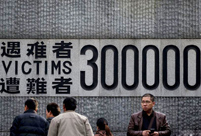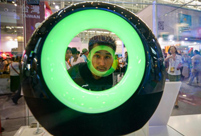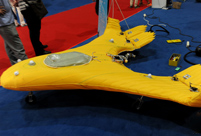 Maritime Silk Road Luxuries of the Han Dynasty
Maritime Silk Road Luxuries of the Han Dynasty
 Ceremony in honor of Confucius held in Sichuan
Ceremony in honor of Confucius held in Sichuan
 Hollywood blockbusters heats up fashion show in NW China
Hollywood blockbusters heats up fashion show in NW China
 Ciao! Chinese beauties!
Ciao! Chinese beauties!
 Naughty polar bear waves to photographer in Wapusk, Canada
Naughty polar bear waves to photographer in Wapusk, Canada
 An eye feast: BFA freshmen registration
An eye feast: BFA freshmen registration
 Top 10 most lavish weddings
Top 10 most lavish weddings
 Most amazing chi-pao beauties
Most amazing chi-pao beauties
 Observe the earth from space
Observe the earth from space
 Chinese lingerie brand arrives in Las Vegas
Chinese lingerie brand arrives in Las Vegas
BEIJING, Sept. 5 -- Recent anti-monopoly and anti-corruption probes in China are rippling across the Western business circle, stirring unease among foreign firms who perceive unfair treatment.
A survey published by the American Chamber of Commerce in China on Tuesday showed that "60 percent of respondents feel foreign business is less welcome in China than before, and 49 percent believe foreign firms are being singled out in recent pricing or anti-corruption campaigns."
The frustrations might be understandable as one after another big foreign name has fallen prey to the probes. However, a closer look at those high-profile cases will prove their concerns are misplaced.
Be it the anti-corruption probe against GlaxoSmithKline (GSK), or the anti-monopoly investigations against Microsoft, Jaguar Land Rover, and Qualcomm, the only reason behind the investigations is the fact that they have broken the law. It has nothing to do with where they are from.
In the GSK case, more than 10 months of investigation found that the British drugmaker offered bribes to boost sales and inflated drug prices to accommodate bribery expenses and high profits, practices no country would hesitate to investigate.
For Microsoft, it was suspected of not fully disclosing information about its Windows operating system and Microsoft Office application, causing incompatibility problems, something that Chinese law holds to be anti-competitive if there is no advance warning to customers.
If GSK got no punishment for what it did in China, all companies doing business in China, including foreign ones, should be really worried about the absence of law enforcement and a fair market.
And the Microsoft probe should not come as a surprise either. It has been embroiled in anti-trust probes in the European Union (EU), Japan, the Republic of Korea and the United States in the past decade. The EU fined it 561 million euros last year.
No company is allowed to break laws with impunity in China. Being a Chinese or foreign firm makes no difference.
This is what foreign companies should learn from these cases, rather than feeling that they are less welcome in China.
State-owned giants China Telecom and China Unicom have been subject to anti-trust probes. Premium alcohol makers Kweichow Moutai and Wuliangye were each fined more than 200 million yuan last year for monopolistic practices.
Some people say the Chinese market, once the hottest growth market for Western firms, is getting chillier. It might be so, but only for those law-breaking ones, be they foreign or homegrown.
All those cases should be seen as signs that the world's second-largest economy is working harder to make companies comply with regulations and build a more fair and equal market. All companies should applaud rather than feel appalled by this.
 "Twin flowers" bloom in the air
"Twin flowers" bloom in the air China names 80 Anti-Japanese War memorial sites
China names 80 Anti-Japanese War memorial sites The 4th China-Eurasia Expo opens in Urumqi
The 4th China-Eurasia Expo opens in Urumqi Tall girls shine at model competition
Tall girls shine at model competition Girl who cannot gain weight: She is 1, 2.9 kilograms
Girl who cannot gain weight: She is 1, 2.9 kilograms Bazinga! Watch out the 'facekini' fashion bomb attack
Bazinga! Watch out the 'facekini' fashion bomb attack Experiencing maiden voyage between Sanya and Xisha
Experiencing maiden voyage between Sanya and Xisha Chinese inflatable aircraft meets public for the first time
Chinese inflatable aircraft meets public for the first time People enjoy delicacies in Tianjin undersea tunnel
People enjoy delicacies in Tianjin undersea tunnel COMAC jumbo jet and its global rivals
COMAC jumbo jet and its global rivals Capital Spirits: the capital's first liquor bar
Capital Spirits: the capital's first liquor bar Chengdu International Auto Show
Chengdu International Auto Show 2014 int’l drone exhibition
2014 int’l drone exhibition Trainings taken by Chinese navy divers
Trainings taken by Chinese navy divers Female PLA honor guards
Female PLA honor guardsDay|Week|Month